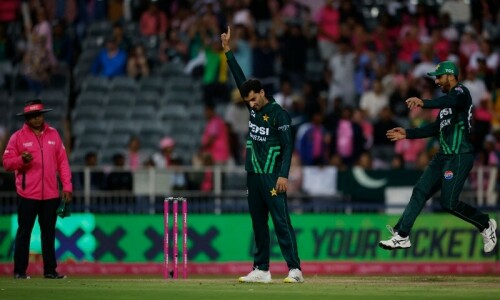To say that the Pakistan Cricket Board (PCB) has had a history of fudging up on the administrative front is an understatement.
The latest Younis Khan-PCB tiff is an embodiment this mess and the subsequent developments have hardly come as a surprise.
Be it the case of legendary opener Hanif Mohammad or the forced conclusion of Mohammad Yousuf’s career, the board is horrible with farewells. In between, Majid Khan, Zaheer Abbas, Mushtaq Mohammad, Javed Miandad and Wasim Akram have gone in a similar manner.
But this also has a lot to do with the Pakistani culture. For some reason our heroes, never know when the right time is either. The board’s action makes sure that it ends on a bitter note.
Imran Khan and Inzamam-ul-Haq are the only two names that come to mind, who it can be said retired ‘gracefully’. This was largely due to the fact that they were leading the team at the end of their careers.
Waqar Younis, who also played his last game for Pakistan as captain in 2003, could perhaps have continued, but with no clear indication from the board, he bid adieu at just 32.
Now the decades-old tradition is ringing true in the case of Younis Khan, who for some is the last of the great Pakistani batsmen. He was excluded from the ODI squad for the Australia series which is being considered a litmus test ahead of the upcoming World Cup. Younis was part of the limited overs squad in the recent series against Sri Lanka, where he could take part only in the first ODI and had to return home because of the sad demise of his young nephew. But having publicly announced his desire to play at the big event next year, one would have hoped the PCB and Younis were at least in some sort of talks about the future.
“They have hurt me, if you say that I am not in future planning then it hurts. I am fit and I am committed. If they had told me that (last month's) Sri Lanka series is your last then I would have left with respect,” Younis said after being dropped from the ODI squad.
But let’s put emotions aside for a minute and ask ourselves a tough question: does Younis, judging by his ODI form over the last couple of years, merit a spot on the limited overs squad?
His last ten innings read like this: 1, 58, 10, 6, 30, 32, 19, 6, 29, 3 and the last of his six ODI hundreds, came way back in 2008 against West Indies in Abu Dhabi. Former Pakistan captain and TV commentator Ramiz Raja was of the view that Pakistan could afford to have either Misbah-ul-Haq or Younis in the middle-order in ODIs as the dynamics of the game had changed dramatically over the last few years. If both are accommodated, then there needs to be a massive shake up in the batting order. In any case, the ‘rotate-the-strike’ role has currently been handed to Fawad Alam who has done a pretty decent job of it.
His last ODI appearance before the August 2014 match came in March 2013, which is a clear indication of how the team was planning and perhaps also of how he was faring with the bat against the white ball.
“I can understand why Younis has reacted the way he did and in the end the selectors have to be clear on if they need him for the World Cup. But at the same time Younis is 36 and he also has to decide his future himself,” Ramiz Raja said while commenting on the issue yesterday. His views brought to mind the recent retirement of Jacques Kallis and how Cricket South Africa (CSA) managed it.
Kallis, like Younis, publicly expressed his desire to play at the 2015 World Cup and CSA, provided him the opportunity to cement his place in a squad teeming with talented newcomers. He was actually not part of South African ODI squad for quite a while either but after his statement, he was given the opportunity to make a comeback. But just after just one series, Kallis called it quits, giving him and the cricket board, the opportunity to bid farewell in an amicable way. The South African great’s last ten ODI innings read like this: 37, 13, 4, 50, 6, 10, 10, 0, 1, 4. By Kallis’ standards, these numbers are pretty obvious of the fact that his powers were waning; the man could see it himself.
"He really wanted to win the World Cup, but I've always appreciated his honesty and I think he realised that he might let the team down,” former South Africa captain Graeme Smith said of his compatriot who ended with a career ODI average of 44.36. And that’s perhaps where the real lesson lies.
This in no way is a numbers comparison between Younis and Kallis. One cannot deny the stature of both.
It is a testament to the cricketing culture of both countries and how matters are dealt with on and off the field and it is still not too late for both Younis and the PCB to change a longstanding, unpleasant tradition.














































